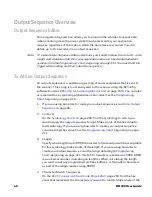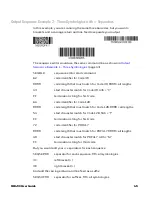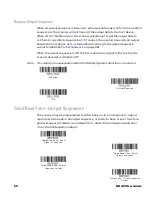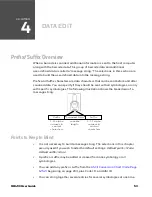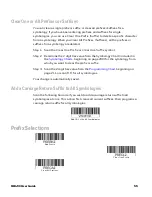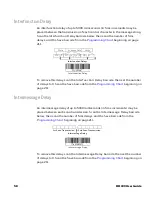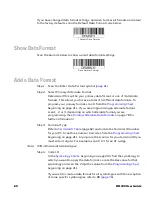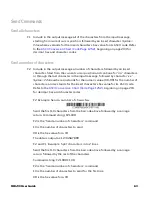
HH490 User Guide
49
Output Sequence Timeout Example
For example, if SEQBLK defines a 4-code sequence, you can specify timeouts of 5,
6, 7, and 8 seconds for codes 1-4 respectively using the command
SEQTIM5000FF6000FF7000FF8000FF. Codes that are not part of the defined
sequence would have an implied timeout of 8 seconds in this case (the final
timeout in the list). To explicitly specify a timeout for such codes, you can include
one more timeout at the end of the list. For example, to include a timeout of 1
second for non-sequence codes, use the command
SEQTIM5000FF6000FF7000FF8000FF1000FF.
Satisfactory Subset of Full Sequence
You can define one or more subsets of barcodes from the complete sequence
specified by SEQBLK. When you scan all the codes from one of these subsets, the
scanner will transmit all the codes it has read in the sequence. The scanner sends
the codes in the order defined by SEQBLK.
Note:
To use the satisfactory subset feature, you must supply a timeout for each code in
the sequence using SEQTIM.
Satisfactory Subset of Full Sequence Timeout Example
To specify a subset, list its members using the SEQSAT command and terminate
each subset with FF. The members of each subset are specified as single hex
digits corresponding to their index within the full sequence, 1 being the first. For
example, to specify two subsets, the first consisting of the first and second code
in the sequence and the second subset consisting of the second and third code,
use the command SEQSAT12FF23FF.
To define a subset with an odd number of codes, insert a 0 before the final code
index. For example, to define a 3-code subset consisting of the first, second, and
third codes, use thecommand SEQSAT1203FF.
Default Output Sequence
Default Sequence programs the scanner to all universal values. Be certain you
want to delete or clear all formats before you read the Default Sequence symbol.
Default Sequence








